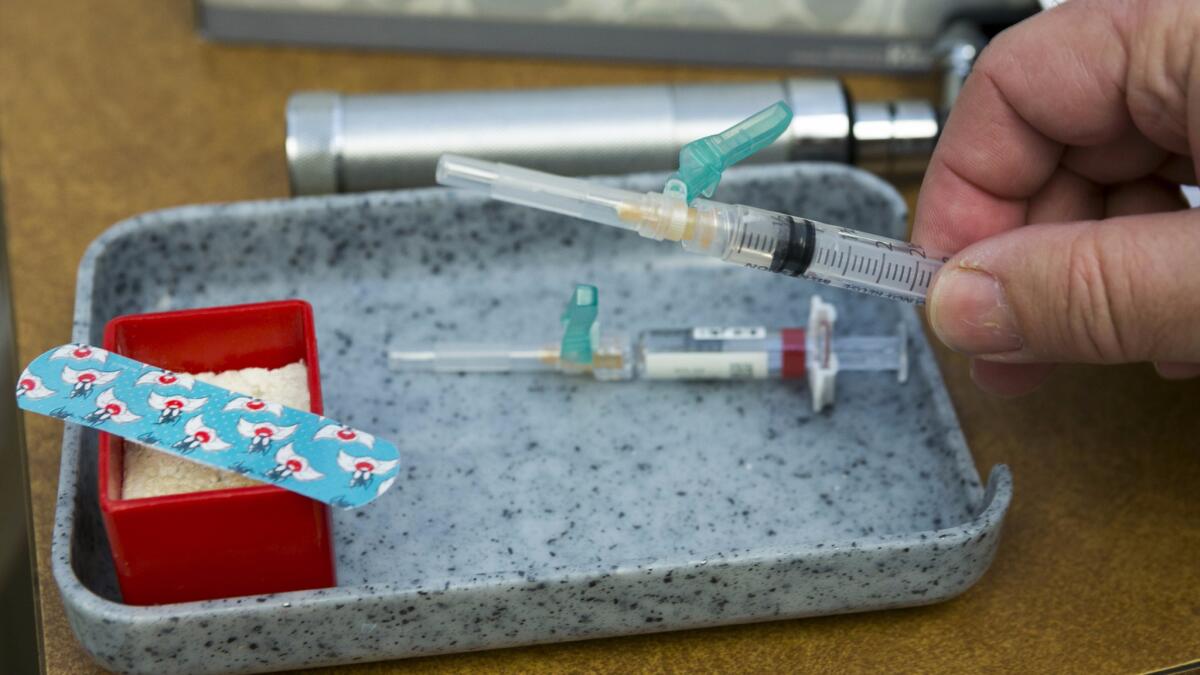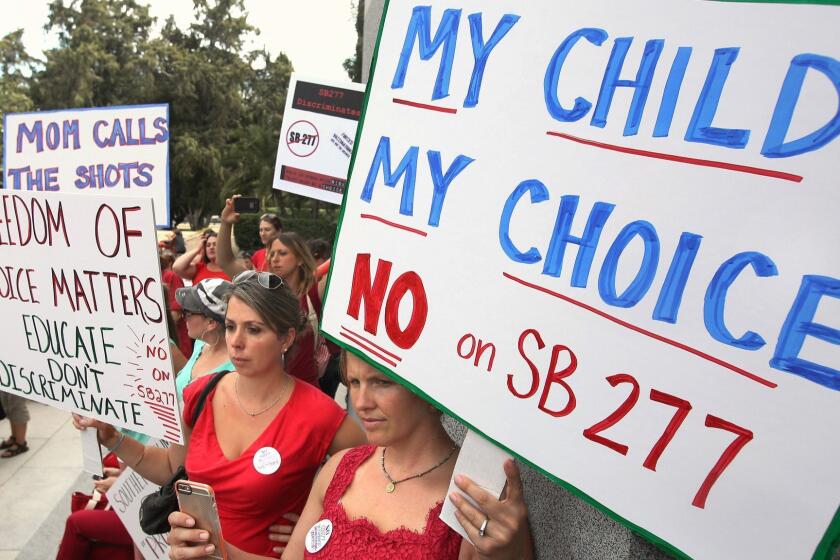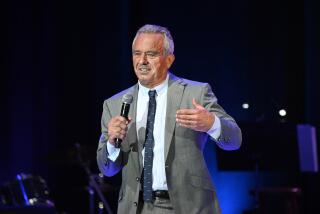Measles infection causes ‘immune amnesia,’ leaving kids vulnerable to other illnesses

- Share via
It’s an article of faith for many parents who refuse to vaccinate their children: When healthy kids get and recover from an infection naturally, their immune systems come out stronger.
But when it comes to measles, the opposite is true, new research shows.
In a group of 77 Dutch schoolchildren whose parents declined to vaccinate them on religious grounds, scientists documented several ways in which a measles infection can hobble a child’s immune function for months — or even years — after beating back the virus.
The effect was mild in some of the children. But in roughly 16% of those who suffered an active measles infection, the result was a severe case of “immune amnesia.”
A genetic census of antibodies — immune proteins that recognize and destroy invading microbes — showed that those children had lost at least some immunity to more than 40% of the microbes that cause common childhood diseases, including influenza, rhinovirus and respiratory syncytial virus. Measles appeared to have stripped away the immune protections built up over years of exposure to diseases and germs, according to a study published Thursday in the journal Science.
A second research team measured the same children’s immune memory 40 days after measles infection and found significant shrinkage in their stores of B-cells, which fight disease by killing infected cells and spawning legions of antibodies to confront viral invaders in the blood. For weeks after the unvaccinated children had recovered, their depleted stocks of B-cells signaled a loss of strength to defend against new infections, according to a report in Thursday’s edition of Science Immunology.
For some, the damage appeared to be even more extensive. In two of 19 measles-infected children tested, the machinery that supplies the immune system with new disease-targeting cells was profoundly disrupted, raising questions about whether they would fully recover their previous strength.
“The measles virus is like a car accident for your immune system,” said Harvard University geneticist Stephen Elledge,the senior author of the Science study. An unvaccinated child who weathers the measles may emerge only slightly the worse from such a crash. Or he might sustain an injury from which it takes months or years to recover.
For parents, he said, the implications are clear: “We know how to prevent injuries in car accidents — by wearing seatbelts. The measles, mumps and rubella vaccine is like a seat belt for your immune system, and parents should buckle their kids up.”
The work sheds new light on the biological basis for a phenomenon long recognized by doctors. After children with measles recover from the rash and fevers, they are highly unlikely to fall ill with it again. But for the next two to three years, they remain unusually vulnerable to other infections, from viruses like the common cold and influenza to potentially deadly bacteria that can cause pneumonia or swelling in the brain.
Researchers reckon that before the introduction of a measles vaccine in 1963, as many as half of childhood deaths from infectious diseases were linked to measles or the immuno-suppression that followed. In that era, this most contagious of viruses infected over 95% of children and directly caused an estimated 2.6 million deaths a year around the world.
But in places where vaccines have virtually eliminated outbreaks, public health officials have documented unexpectedly large reductions in childhood deaths from other diseases. Preventing measles infections was clearly saving kids from other bugs as well, experts say.
The question of how measles sets kids up for poorer health might have lost its urgency if global vaccine campaigns were expanding without pushback. But they are not. Every year, more than 7 million people, mostly in poor countries, are still infected, and roughly 100,000 die.
And growing vaccine refusal in the United States and Europe has made a mark in the world’s most affluent countries. In the first three months of 2019, vaccine resistance helped drive worldwide cases of measles up 300% compared to the first quarter of 2018, according to the World Health Organization.
The United States declared measles eliminated in 2000. But pockets of “anti-vaxxers” have allowed it to gain a foothold in communities across the nation. There have been 22 U.S. outbreaks in the first nine months of the year, and of 1,250 patients documented in 31 states during that period, 89% were unvaccinated or did not know their vaccination status.
Not since 1992 has the tally of measles cases in the United States reached so high. While none have died, 119 required hospitalization and 60 developed pneumonia. One patient suffered encephalitis, a life-threatening swelling of the brain.
Seizing our newborn infants, Blighting their lives with pain; Filling their veins with poison, Tainting each tender brain.
“Measles is not a trivial disease, and these findings add evidence that it’s important to vaccinate your kids against it,” said Dr. Anthony Fauci, director of the National Institute of Allergy and Infectious Diseases. “There’s scientific proof here that not only is measles itself a serious disease; it can have consequences of suppressing the body’s defense mechanisms for a year or more.”
The children in the new studies belong to a Dutch sect of orthodox Protestants who formed a closed community with their own churches, schools, newspapers and political party. They have declined immunizations since the 19th century, when vaccination campaigns gained steam and drew protests throughout the United States and Europe. Their opposition rests on passages in the Bible that call on believers to trust in divine providence for protection.
In the United States, discredited claims that the measles, mumps and rubella vaccine is a cause of autism have driven down vaccination rates in pockets across California, New York and elsewhere. False claims circulating among members of New York City’s Orthodox Jewish community — that MMR vaccine contains monkey, rat and pig DNA and contravenes kosher dietary requirements — have figured prominently in recent outbreaks. More than three-quarters of measles cases in the United States this year have been in New York.
The Dutch children in the new studies ranged in age from 4 to 17, and they were followed for up to eight weeks after their infections. Each research team also conducted animal studies and saw that measles affects immunity in real and enduring ways.
One of the teams, led by immunogeneticist Velislava Petrova of the Wellcome Sanger Institute in England, used ferrets to demonstrate post-measles vulnerability to flu. Even after the animals had been immunized against influenza, those that were infected with measles and then exposed to flu virus got much sicker than their counterparts who had not had measles.
A second team, led by Elledge and Harvard epidemiologist Michael Mina, assessed the array of antibodies in four rhesus macaques before and after measles infection. For five months after their infections cleared, the monkeys lost immunity to an average of 40% to 60% of diseases tested.
Mina and Elledge said their work offers new insights into the longstanding mystery of how measles seems to put children at increased risk of infections. It also underscores the outsized value of a simple protective step: giving a child the MMR vaccine just after her first birthday and again between the ages of 4 and 6.
Such evidence may not sway the most committed vaccine opponents, Mina said, but “most people are really trying to do what’s right for their kids.” Even when parents are inclined to believe their child could weather a bout of rash and fevers, “telling them that for the next few years they’re going to have to look over their kid’s shoulder at diseases he might get sick from, that makes this amnesia effect quite a bit more scary.”








